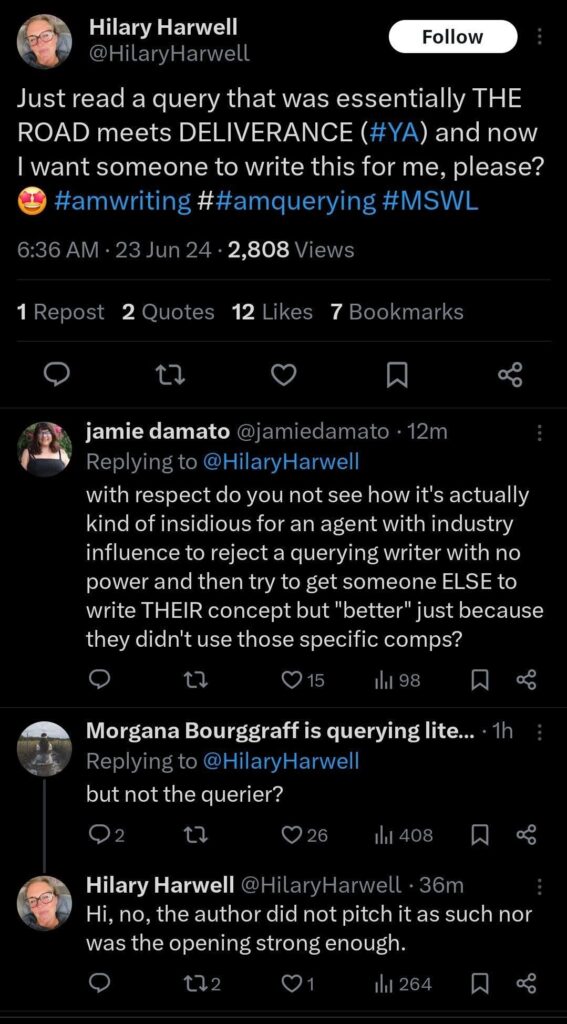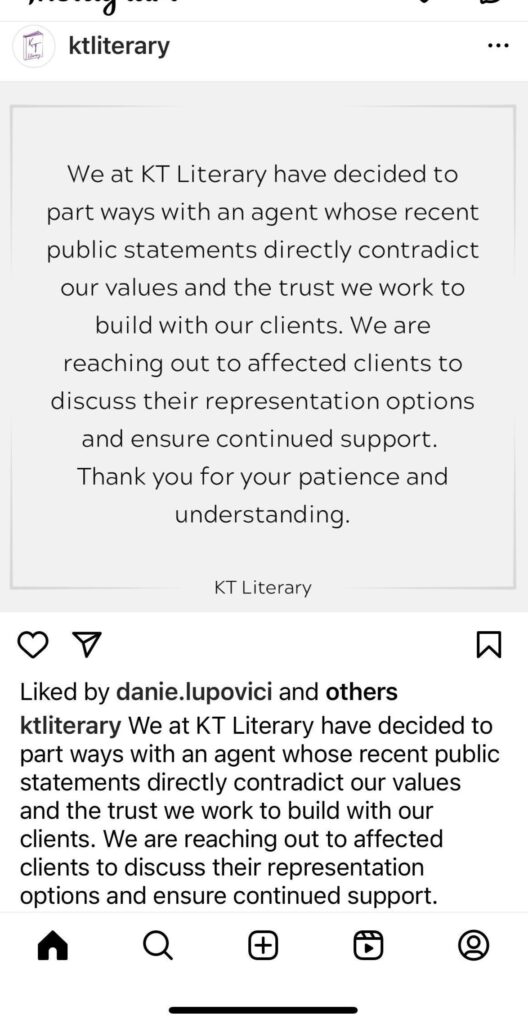On June 23rd, literary agent Hillary Harrell of KT Literary took to Twitter to discuss a submission with a concept they* loved:
Just read a query that was essentially THE ROAD meets DELIVERANCE (#YA) and now I want someone to write this for me, please?
It was followed by hashtags, a starry eyed emoji, and utter bafflement across author social media on every platform.
Morgana Bourggraff, whose Twitter username indicates that they are currently querying agents, asked:
but not the querier?
To which Harrwell responded:
Hi, no, the author did not pitch it as such nor was the opening strong enough.
Another Twitter user, Jamie Damato asked:
with respect, do you not see how it’s actually kind of insidious for an agent with industry influence to reject a querying writer with no power and then try to get someone ELSE to write THEIR concept but “better” just because they didn’t use those specific comps?
echoing the rest of us, who were understandably apoplectic with rage. Absolutely, it’s “kind of” insidious. It’s despicable. It’s unprofessional. It’s unforgivable.
And it happens all the time.
In 2019, I tweeted extensively about the link between Kim Richardson’s The Book Woman of Troublesome Creek and the blatant similarities in JoJo Moyes book The Giver of Stars. The plagiarism was obvious: Moyes “wrote” a scene allegedly based off a historical anecdote that also appeared in Richardson’s book. But it wasn’t a historical anecdote at all. It was fiction, written by Richardson, who coincidentally wrote for a different imprint at the same publishing house as Moyes. And while tons of questions remain unanswered (why and how did Moyes, an author from the UK, become so gripped with interest over a niche bit of Appalachian history? What incentive did the publishing house have to investigate these claims? Are we supposed to believe that their in-house lawyers ever had any intention of bringing suit against themselves?), the scandal itself went quietly away. Moyes will continue her career as a wildly selling author and staple of celebrity book clubs. Richardson will probably always feel a pit of injustice in her stomach when she looks at the book she poured her heart, soul, and countless hours of research into. And, as always, traditional publishing and name recognition have won.
This is the way traditional publishing works.
Take the ongoing lawsuit brought by Liz Freeman against Tracy Wolff, Emily Sylvan Kim, Entangled Publishing, and Liz Pelletier, among others. The original filing is an eighty-six page catalogue of similarities from plot, scenes, character names, and sometimes clearly reworked passages of text. While some of the similarities wouldn’t have been damning on their own, the sheer number of “coincidences,” along with the basic facts that Wolff was Kim’s client and good friend, and that Freeman’s book was submitted to Entangled and pitched to Liz Pelletier herself (facts which Entangled’s lawyers don’t deny), seem suspicious, don’t they?
If you haven’t heard of the lawsuit, you’re not alone. It hasn’t received the industry-wide attention it should be receiving. Why? Because Crave was a hit, as was Fourth Wing, and therefore aspiring traditional writers can’t discuss it. What if they miss their big chance to be the next Fourth Wing at a publisher that’s experiencing such success that a pre-order listing with no title or blurb shot to #1 on Amazon within hours? If they keep their head down (or publicly dismiss the severity of the infringement as “there are no new ideas”), they might get into Pelletier’s good graces. And they certainly won’t cross anyone else in traditional publishing.
In 2003, an aspiring author I knew submitted to a major publisher. It was rejected on the basis of the heroine being an exotic dancer, something the imprint “doesn’t do.” Less than six months later, a book with a very similar plot (including the exotic dancer heroine that the rejection letter claimed was verboten by imprint rules), was published, written by a successfully midlist author. Though there were slight changes to the story itself, the back cover copy was the aspiring author’s query letter. Word-for-word.
What recourse did that aspiring author have? Social media didn’t exist in the form we’re familiar with now. There was no way to call them out. And even if she had, this was before Amanda Hocking blew the doors wide open for self-publishing. The only chance this aspiring author had at being a “real author” was to court traditional publishers. If she’d sought justice, she probably wouldn’t have gotten it, anyway (authors in her position rarely do), and it would destroy her chances of ever successfully submitting to any publishing house.
And this is how traditional publishing always wins: they hold the power. If a publisher or agent decides that your manuscript is good enough to publish, but would make better sales with someone else’s name on it, they’ll just have someone else rewrite it.
KT Literary Agency did make a statement regarding their now-former agent’s behavior:
We at KT Literary have decided to part ways with an agent whose recent public statements directly contradict our values and the trust we work to build with our clients. We are reaching out to affected clients to discuss their representation options and ensure continued support. Thank you for your patience and understanding. KT Literary.
But what did this agent get fired for, other than getting caught? Is it truly about damaged trust between author and agency, or did Harwell break a code of silence within an industry that continues to exploit querying authors to pad their wallets and elevate their more profitable clients?
I think we’d all like to believe it’s the former. But any realist knows that it’s the latter.
*All unknown pronouns have been replaced with the gender neutral singular “they”
Correction 6/25/24 – Agent Emily Sylvan Kim was misidentified as Emily Silver Kim. Kim is not affiliated with author Emily Silver.


Well, this is disheartening to hear but also not surprising. I guess if I ever finish my second and third novels, I’ll just self pub again. I’m shit at selling myself but at this point, I just write because I like to and if even one person reads and likes it that’s a win for me. At least it’s got my name on my idea.
That’s exactly where I am at rn.
Marketing? I am shit at.
Writing? I love.
Trad pub?
I don’t need anyone telling me what and how to write and then giving me pennies for it. While I’d still have to do the heavy lifting with marketing and social media.
Hahaha. No.
Yup. I’ve never published anything, but even my fanfics weren’t too popular when I used to write fanfic. Then again, I’ve also never been up-to-date with popular fandoms. Anyway, I do want to have my stories see the light of day sometime, but I’ll go the self-publishing way. Like you said, I write because I like it and it’ll have my name on it.
This lawsuit over Crave makes me even more happy that I didn’t read the series. To still someone’s work like that is just awful. I am sure it will keep happening as long as no one is held to the file.
I was well aware of the JoJo Moyes / Kim Michelle Richardson debacle. The repurposing of Kim’s book was crystal clear. Her publisher wouldn’t stick up for her. JoJo Moyes was a bigger name. Reece Witherspoon’s Book club features Moyes’s book. To this day Moyes continues to be applauded for her work, people saying — ‘Oh the books are so different.’ I’ll never read anything Moyes has written ever again. https://www.buzzfeednews.com/article/tomiobaro/jojo-moyes-the-giver-of-stars-kim-richardson-bookwoman-of
I need to buy & read The Book Woman. I suppose I owe Richardson that much, in a way. I’ve read The Giver of Stars in hopes of using it as a comp, and I *have* used it as a comp, because it’s a big name and a big seller, and it’s a competently written women’s historical that focuses on local drama in a rural community, which was actually kind of hard to find. But to be honest I thought the ending was rushed and just really poorly done, like she slapped a victory on the court case and tied everything up quick under a fast-approaching deadline…
Anyway thanks for the link, I’d heard of the plagiarism story but somehow I don’t remember reading that specific fact–that details that might appear to be historical but were actually invented by Richardson appeared in Moyes’ book. That’s pretty damning.